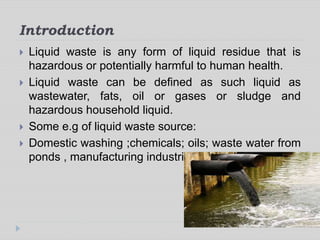The Single Strategy To Use For Reclaim Waste
The Single Strategy To Use For Reclaim Waste
Blog Article
Our Reclaim Waste Statements
Table of ContentsThe Single Strategy To Use For Reclaim WasteHow Reclaim Waste can Save You Time, Stress, and Money.Our Reclaim Waste PDFs4 Easy Facts About Reclaim Waste ShownReclaim Waste Things To Know Before You Get This
Residential sewage waste refers to the waste and products from a domestic septic container. The appropriate monitoring and disposal of residential sewage waste require fluid waste to be transferred to a sewer therapy plant where the proper methods and tools are used to cleanse and dispose of waste.
Industrial waste often includes possible risks, such as flammable products or a combination of liquid and strong waste items, and calls for an advanced and detailed disposal process. The disposal of commercial waste typically entails the purification of waste before transport to guarantee secure and correct disposal. Hazardous waste is developed from results and runoff of commercial procedures and production.
This type of waste can not utilize the exact same sewer monitoring transport or procedures as septic or commercial liquids. The hazardous waste administration procedure needs the evaluation and testing of fluid waste prior to it goes through the disposal procedure (liquid waste removal melbourne). Runoff waste is the fluid waste that comes from overflow and excess stormwater in very inhabited locations or cities
Runoff waste can cause contamination and flooding if not managed properly. Making sure correct waste monitoring can prevent disasters and minimize ecological injury.
The smart Trick of Reclaim Waste That Nobody is Discussing
Contact PROS Solutions today to discover our waste administration and disposal services and the appropriate means to look after the fluid waste you generate.
(https://anotepad.com/note/read/pkncyr85)Do you recognize what occurs to your water when you disengage, purge the bathroom or drain the cleaning device? No? Well, it deserves knowing. This so-called 'wastewater' is not only an essential resource yet, after therapy, will be launched to our land, waterways or the ocean. Utilized water from commodes, showers, bathrooms, kitchen area sinks, washings and industrial procedures is called wastewater.

water made use of to cool equipment or clean plant and tools). Stormwater, a type of click to find out more wastewater, is drainage that flows from farming and urban locations such as roof coverings, parks, gardens, roadways, courses and rain gutters into stormwater drains, after rain. Stormwater streams unattended straight to local creeks or rivers, ultimately getting to the ocean.
Reclaim Waste - Questions
In Queensland, the majority of wastewater is treated at sewage treatment plants. Wastewater is delivered from residential or commercial websites via a system of drains and pump terminals, referred to as sewage reticulation, to a sewage treatment plant. City governments develop, preserve and operate most sewer therapy plants. Operators are licensed under the Environmental Defense Act 1994 to release cured wastewater at an acceptable environmental standard right into rivers.
The Division of Natural Resources advises city governments regarding handling, operating and preserving sewerage systems and therapy plants. In unsewered locations, neighborhood federal governments may require homeowners to set up private or house sewer treatment systems to deal with domestic wastewater from commodes, kitchens, washrooms and laundries. The Division of Natural Resources authorises making use of family systems when they are shown to be reliable.
In some new subdivisions, treatment of some stormwater to remove litter, sand and gravel has actually started utilizing gross contaminant catches. Wastewater treatment happens in 4 stages: Removes solid issue.
Makes use of tiny living microorganisms knows as micro-organisms to break down and eliminate staying liquified wastes and fine fragments. Micro-organisms and wastes are integrated in the sludge.
Some Of Reclaim Waste
Nutrient removal is not readily available at all sewage treatment plants because it needs costly specialist devices. Clear liquid effluent created after treatment may still have disease-causing micro-organisms - liquid waste disposal.

This usually indicates wastewater needs to be dealt with or impurities removed prior to it can be released to waterways. The majority of wastewater moves right into the sewerage system. Under the Act, city governments provide approvals and licences for ecologically relevant tasks (Ages) including wastewater releases that could have a regional influence. The division provides approvals and licences to ERAs entailing wastewater launches that might have a regional or statewide influence.
Reclaim Waste Fundamentals Explained
Or else, samples are taken for research laboratory evaluation. Frequently many tests are required to establish the levels of each of the different pollutants such as oils, hefty metals and pesticides in water. Tracking provides factual info regarding water high quality and can validate that licence conditions are being met. The info obtained through tracking provides the basis for making water quality decisions.
Report this page